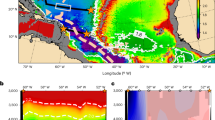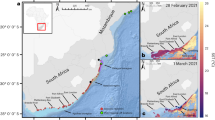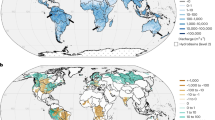Abstract
ALTHOUGH measurements of the mercury concentration in sea water have been made by several investigators1–13, the reported values are widely scattered and it may be significant that almost all the samples were kept in polyethylene bottles after acidification. Weiss et al.14 have reported that the main source of mercury in the oceans was the degassing of the Earth's crust by way of the atmosphere. It should then be supposed that the large experimental variations for open oceans does not reflect the true situation.
This is a preview of subscription content, access via your institution
Access options
Subscribe to this journal
Receive 51 print issues and online access
$199.00 per year
only $3.90 per issue
Buy this article
- Purchase on Springer Link
- Instant access to full article PDF
Prices may be subject to local taxes which are calculated during checkout
Similar content being viewed by others
References
Stock, A., and Cucuel, F., Naturwissenschaften, 22, 390 (1934).
Hamaguchi, H., Kuroda, R., and Hosohara, K., J. chem. Soc. Japan, 82, 347 (1961).
Burton, J. D., and Leatherland, T. M., Nature, 231, 440 (1971).
Leatherland, T. M., Burton, J. D., McCartney, M. J., and Culkin, F., Nature, 232, 112 (1971).
Carr, R. A., Hoover, J. B., and Wilkniss, P. E., Deep-Sea Res., 19, 747 (1972).
Cranston, R. E., and Burton, J. D., Environ. Sci. Tech., 6, 274 (1972).
Weiss, H. V., Yamamoto, S., Crozier, T. E., and Mathewson, J. H., Environ. Sci. Tech., 6, 644 (1972).
Preston, A., Jeffries, D. F., Dutton, J. W. R., Harvey, B. R., and Steel, A. K., Environ. Poll., 3, 64 (1972).
Leatherland, T. M., Burton, J. D., Culkin, F., McCarthey, M. J., and Morris, R. J., Deep-Sea Res., 20, 679 (1973).
Gardner, D., and Riley, J. P., Nature, 241, 526 (1973).
Gardner, D., and Riley, J. P., Estuar. coast. mar. Sci., 1, 191 (1973).
Fitzgerald, R. A., Gordon, D. C., Jr, and Cranston, R. E., Deep-Sea Res., 21, 139 (1974).
Williams, P. M., Robertson, K. J., Chew, K., and Weiss, H. V., Mar. Chem., 2, 287 (1974).
Weiss, H. V., Koide, M., and Goldberg, E. D., Science, 174, 692 (1971).
Matsunaga, K., Mizushorigijitsu, 16, 639 (1975).
Bothner, M. H., and Robertson, M. H., Analyt. Chem., 47, 592 (1975).
Fitzgerald, W. F., and Lyons, W. B., Limmol. Oceanogr., 20, 468 (1975).
Nishimura, M., Matsunaga, K., and Konishi, S., Japan Analyst, 24, 655 (1975).
Author information
Authors and Affiliations
Rights and permissions
About this article
Cite this article
MATSUNAGA, K., NISHIMURA, M. & KONISHI, S. Mercury in the Kuroshio and Oyashio regions and the Japan Sea. Nature 258, 224–225 (1975). https://doi.org/10.1038/258224a0
Received:
Accepted:
Issue Date:
DOI: https://doi.org/10.1038/258224a0
This article is cited by
-
Mercury concentration in the ocean
Journal of the Oceanographical Society of Japan (1983)
-
Vertical distribution of mercury in sediments from the East Pacific Rise
Nature (1981)
-
Mercury distribution in seawater in Minamata Bay and the origin of particulate mercury
Journal of the Oceanographical Society of Japan (1978)
-
Mercury in surface waters of seas around the United Kingdom
Nature (1977)
-
Estimation of variation of mercury concentration in the oceans during the last several decades
Journal of the Oceanographical Society of Japan (1976)
Comments
By submitting a comment you agree to abide by our Terms and Community Guidelines. If you find something abusive or that does not comply with our terms or guidelines please flag it as inappropriate.



